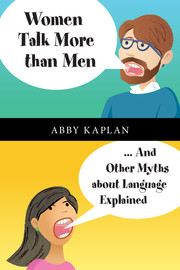Book contents
- Frontmatter
- Contents
- List of figures
- List of tables
- Acknowledgments
- 1 Introduction
- Part I … But is it language?
- Part II Language learning
- 5 ‘Children have to be taught language’
- 6 ‘Adults can't learn a new language’
- 7 ‘Being bilingual makes you smarter (or dumber)’
- Part III Language in use
- Appendix A Statistics brief reference
- Language index
- People index
- General index
6 - ‘Adults can't learn a new language’
from Part II - Language learning
Published online by Cambridge University Press: 05 April 2016
- Frontmatter
- Contents
- List of figures
- List of tables
- Acknowledgments
- 1 Introduction
- Part I … But is it language?
- Part II Language learning
- 5 ‘Children have to be taught language’
- 6 ‘Adults can't learn a new language’
- 7 ‘Being bilingual makes you smarter (or dumber)’
- Part III Language in use
- Appendix A Statistics brief reference
- Language index
- People index
- General index
Summary
Every human being learns at least one native language as an ordinary part of growing up. Exceptions are rare – severe abuse, for example, or physical or mental disorders that interfere with ordinary first-language acquisition. Not only that, but the process of learning a first language is remarkably uniform across individuals and communities: children typically go through similar stages in a similar order, although the exact timing of those stages is different for every child. And the outcome is always the same: every adult is a fluent, competent speaker of his or her native language.
But learning a second language is a very different thing. As discussed in Chapter 7, people vary widely in whether they speak multiple languages; and if so, how those languages are learned, and why. In some communities, it's ordinary and expected that people will continue to learn new languages into adulthood; in others, learning a second language is a rare accomplishment. And the outcome is anything but uniform: some people eventually learn a second language so well that they're almost indistinguishable from native speakers, while others have a strong accent even after decades of experience.
Second-language learning, then, leaves us with two mysteries: Why isn't it as successful as learning a first language? And why is it so much easier for some people than for others? In this chapter, we will explore these two related questions; our case study will focus on whether there is a ‘critical period’ for second-language learning – a restricted age range outside of which it's simply impossible to learn a new language as well as a native speaker. To put it differently: if you start learning a new language at 40, are you doomed to failure? Or, if you don't succeed, are you just not trying hard enough?
Age and second-language acquisition
The critical period hypothesis
The most obvious difference between first- and second-language acquisition is age. Your first language, of course, is the one (or perhaps more than one) that you learn as an infant and very young child. By definition, though, a second language is one that you learn after you already have a first language; we can't meaningfully talk about second-language acquisition until a person is old enough to already have a first language.
- Type
- Chapter
- Information
- Women Talk More Than Men... And Other Myths about Language Explained, pp. 111 - 131Publisher: Cambridge University PressPrint publication year: 2016



